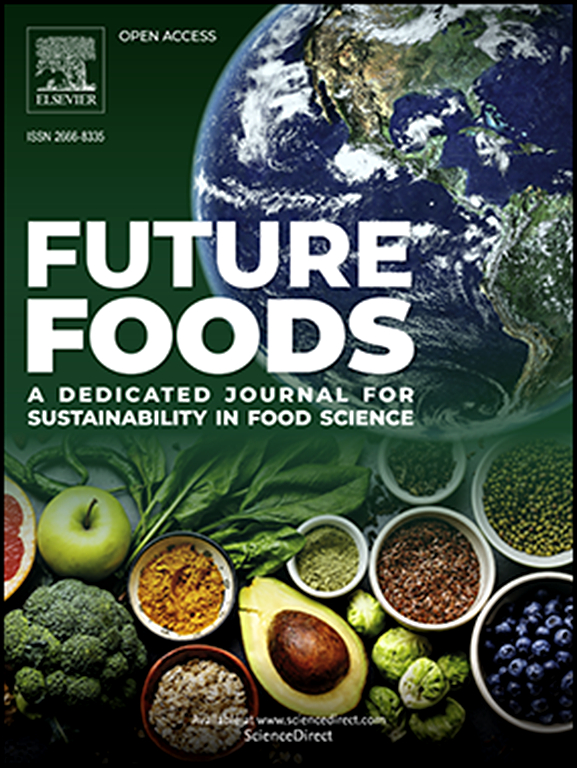用稳定增殖的猪肌肉干细胞和可食用支架生产人造肉
IF 8.2
Q1 FOOD SCIENCE & TECHNOLOGY
引用次数: 0
摘要
为了实现高品质人造肉的规模化生产,开发一种既能高效扩增肌肉干细胞(MuSCs)又能保持其分化潜能的培养体系,以及一种成本低、机械强度好、细胞相容性高的可食用支架体系至关重要。在这项工作中,我们发现丙戊酸(VPA)能够促进猪musc的增殖,同时显著维持其成肌分化潜能。在机制上,VPA通过激活Notch信号显著维持Pax7+/MyoD+细胞的数量。此外,通过VPA和四种细胞因子的联合应用,开发了一种高效的猪MuSCs扩增策略,使猪MuSCs能够长期稳定增殖60天,并能够产生多核肌管。在此基础上,我们通过3D打印技术构建了丝素蛋白(SF)-海藻酸钠(SA)复合水凝胶组成的可食用支架,并通过在SF-SA支架上高效的猪musc肌生成,制备出质地优异的细胞基猪肉。本研究为MuSCs的大规模稳定扩增和结构化培养肉组织的制备提供了可行的策略。本文章由计算机程序翻译,如有差异,请以英文原文为准。

Production of cultivated meat with stably proliferated porcine muscle stem cells and edible scaffolds
To achieve large-scale production of high-quality cultivated meat, it is crucial to develop a culture system that efficiently expands muscle stem cells (MuSCs) while maintaining their differentiation potential, as well as an edible scaffolding system that combines low cost, good mechanical strength, and high cell compatibility. In this work, we identified that valproic acid (VPA) was able to promote the proliferation of porcine MuSCs while significantly maintaining their myogenic differentiation potential. Mechanistically, VPA significantly maintained the population of Pax7+/MyoD+ cells through the activation of Notch signaling. Moreover, an efficient expansion strategy for porcine MuSCs was developed through the combined application of VPA and four cytokines, which enabled long-term stable proliferation of porcine MuSCs for 60 days and remained capable of generating multinucleated myotubes. Furthermore, we developed an edible scaffold composed of silk fibroin (SF)-sodium alginate (SA) composite hydrogels by 3D printing and manufactured cell-based pork with outstanding texture by efficient myogenesis of porcine MuSCs on the SF-SA scaffold. This study provides a feasible strategy for the large-scale and stable expansion of MuSCs and the fabrication of structured cultivated meat tissues.
求助全文
通过发布文献求助,成功后即可免费获取论文全文。
去求助
来源期刊

Future Foods
Agricultural and Biological Sciences-Food Science
CiteScore
8.60
自引率
0.00%
发文量
97
审稿时长
15 weeks
期刊介绍:
Future Foods is a specialized journal that is dedicated to tackling the challenges posed by climate change and the need for sustainability in the realm of food production. The journal recognizes the imperative to transform current food manufacturing and consumption practices to meet the dietary needs of a burgeoning global population while simultaneously curbing environmental degradation.
The mission of Future Foods is to disseminate research that aligns with the goal of fostering the development of innovative technologies and alternative food sources to establish more sustainable food systems. The journal is committed to publishing high-quality, peer-reviewed articles that contribute to the advancement of sustainable food practices.
Abstracting and indexing:
Scopus
Directory of Open Access Journals (DOAJ)
Emerging Sources Citation Index (ESCI)
SCImago Journal Rank (SJR)
SNIP
 求助内容:
求助内容: 应助结果提醒方式:
应助结果提醒方式:


